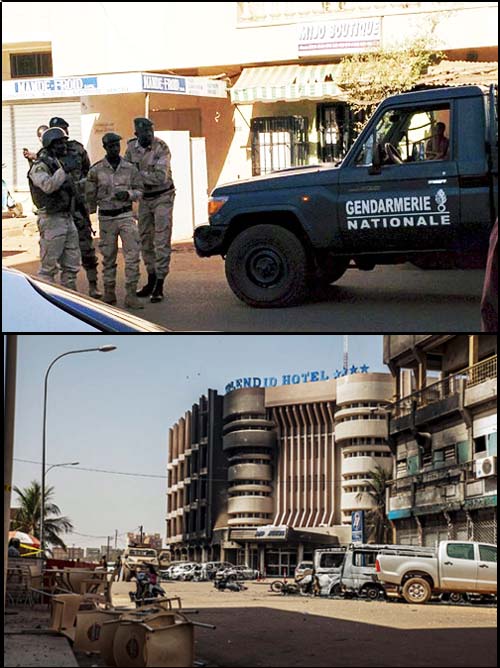Acts of staged terrorism appear to be at heart of two recent hotel attacks by so-called Islamist insurgent groups in West Africa. In November, U.S. and French special forces troops, including French “special police” paramilitary personnel, just happened to be on the scene of a terrorist attack on the Radisson Blu hotel in Bamako, the capital of Mali. After the U.S. and French forces engaged the terrorists who took over the hotel and seized hostages, six Americans were reportedly among those freed.
Two Islamist groups, Al Mourabitoun and Al Qaeda in the Islamic Maghreb (AQIM), claimed responsibility for the attack. The so-called terrorists managed to gain access to the hotel, which is located in a secure compound, by evading security forces stationed at the hotel’s perimeter. The terrorists arrived within the hotel compound in a car bearing diplomatic plates. An American staying in the hotel died in the attack.
Last month, the same exact scenario played out in Ouagadougou. Islamist terrorists, evading perimeter security, stormed the Hotel Splendid and the Ukrainian-owned Restaurant Cappuccino across the street. Some twenty-three people were killed in the attacks on the two locations in the Burkinabe capital. U.S. and French special forces personnel were not only present at the scene immediately after the attack but some were staying at the hotel.
In the cases of Bamako and Ouagadougou, each terrorist unit was reportedly composed of three to ten personnel. None of the terrorists survived the attack. A fourth terrorist in Ouagadougou was killed at the Hotel Yibi.
Ouagadougou is the location of a major U.S. intelligence surveillance operation in West Africa code named CREEK SAND. An intelligence fusion center in Ouagadougou is code named AZTEC ARCHER.
Burkinabe military forces used the occasion of the attack to round up as suspects several members of the National Movement for the Liberation of Azawad (MNLA), a Tuareg separatist group seeking independence for their homeland in northern Mali. The MNLA is a sworn enemy of Al Qaeda and its affiliates. After a military coup in Mali, Al Qaeda and allied Islamist terrorist groups seized control of northern Mali with suspected French and American help, after the MNLA declared the region independent as the Republic of Azawad. Also arrested after the attack on the hotel were a Tuareg candidate for the presidency of Niger, Adal Rhoubed, and three other citizens of Niger. Rhoudeb was on a visit to Burkina Faso at the time of his arrest. The U.S. Africa Command (AFRICOM) has conducted, along with the Central Intelligence Agency, a clandestine war against African separatist groups in order to protect the interests of U.S. oil, natural gas, mining, and other corporate interests in Africa. Chief among AFRICOM’s and the CIA’s targets are the Tuaregs, many of whom received support in the past from Muammar Qaddafi’s government in Libya.

Malian troops outside the besieged Radisson Blu Hotel in Bamako (top) and scene outside the Hotel Splendid in Ouagadougou (bottom). In both terrorist attacks, U.S. and French Special Forces were present before the attacks occurred.
Terrorist attacks by so-called Islamists targeting a shopping mall in Nairobi and a hotel in Tripoli, Libya also bore the fingerprints of Western intelligence operations.
On February 2, a bomb blast in Benin City, the capital of Edo State in southern Nigeria, destroyed five homes. The source of the bomb was said to be an improvised explosive device (IED). Benin City and Edo State have largely escaped terrorist activity blamed on the Islamist terror group Boko Haram. Southern Nigeria is the location of several separatist movements, which are largely composed of Christians seeking a break from Nigeria and its large Muslim population.
What appears to be playing out in Africa is a newer version of the CIA’s and NATO’s “Gladio” false flag operations in Europe during the Cold War. U.S. paid right-wing and fascist agents carried out terrorist attacks throughout Europe that were blamed on left-wing groups in an effort to dissuade European voters from choosing leftist and other communist parties. In Africa, the Gladio-like operations are used to justify cracking down on separatists and the democratic opposition in countries ruled by oligarchs indebted to multinational corporations and the World Bank and International Monetary Fund.
Previously published in the Wayne Madsen Report.
Copyright © 2016 WayneMadenReport.com
Wayne Madsen is a Washington, DC-based investigative journalist and nationally-distributed columnist. He is the editor and publisher of the Wayne Madsen Report (subscription required).


